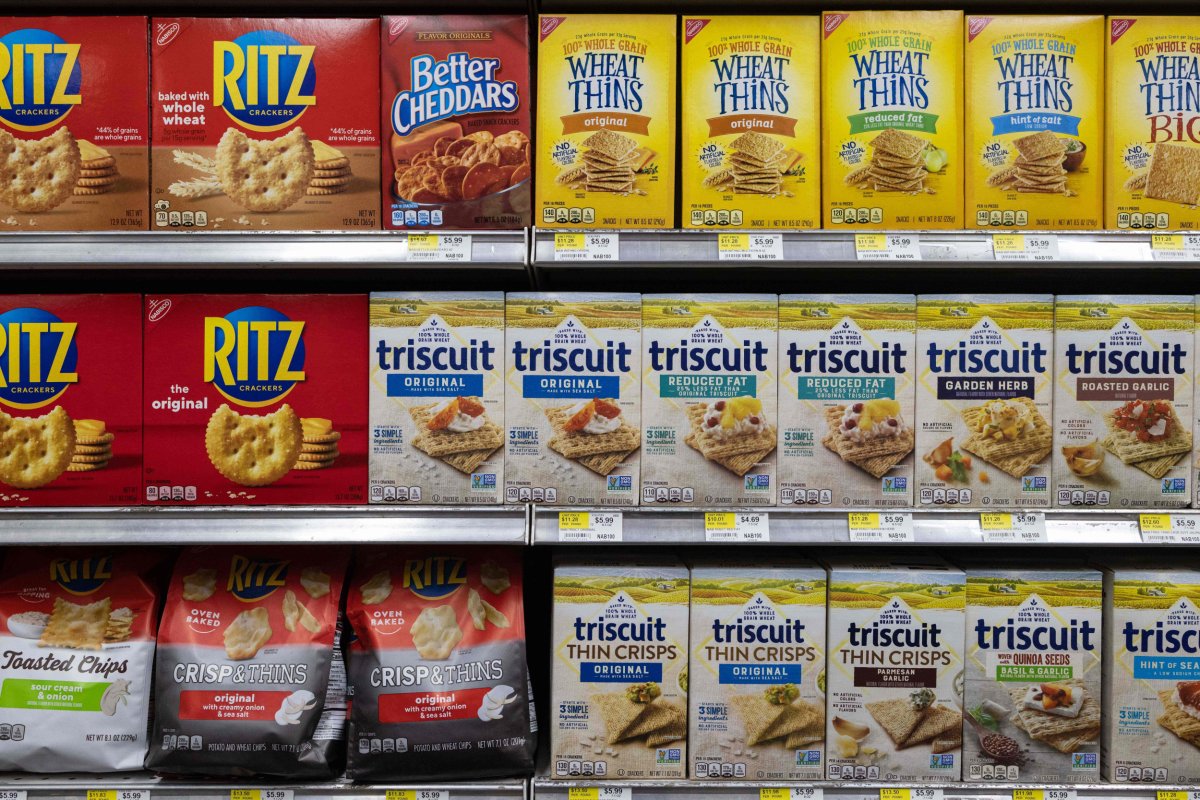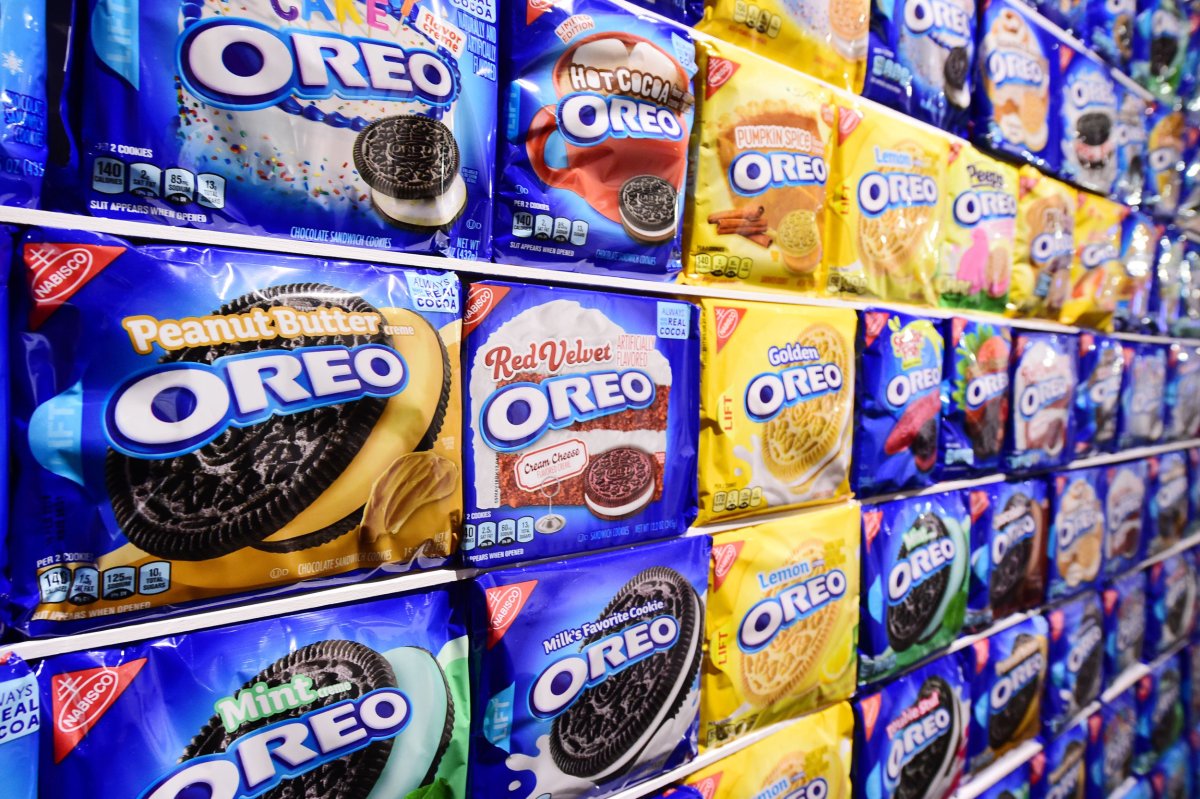When walking down the grocery store aisle, it seems that there are more snack options than ever. So how does one choose what to eat? While some grab familiar favorites, others are curious about new products that can meet their evolving tastes. Either way, consumers are filling their carts with cookies, chips and bars.
According to a new study from snack food giant Mondelēz International, nearly 90 percent of consumers surveyed reported that they eat snacks daily.
Mondelēz is one of the largest snack companies in the world, reaching approximately $36 billion in revenue in 2023. Its brands include snack staples like Chips Ahoy!, Oreo, Honey Maid, Ritz, Triscuit and international chocolate brands like Cadbury and Milka.
Last week, Mondelēz published its 2023 State of Snacking report, which shares insights about global consumer trends in snacking. This is the company's fifth annual report that tracks snacking trends across different countries and demographics. The study, which was conducted in partnership with The Harris Poll, surveyed over 3,600 adults in 12 countries.
Overall, the study found that people want more from their snacks. Consumers are choosing brands that align with their values, and they report putting a greater emphasis on snacking for perceived health benefits, like boosting energy, improving mood and aligning with fitness goals. Nearly 80 percent said they appreciate snacks more "when consumed mindfully," and 67 percent said they seek snacks that work to minimize their environmental impact.
Mondelēz International Chief Marketing and Sales Officer Martin Renaud told Newsweek that the company uses the findings of the report to inform many of its marketing decisions as snacking remains "a consistent daily ritual."
"We are following the consumer behaviors and needs very closely," he said. "The high majority of people snack every day...and we have seen that this habit is continuing to grow from more active snacking per day."
Mondelēz brands Halls, Chips Ahoy!, Wheat Thins and Cadbury all ranked first in their respective categories in the Most Trusted Brands 2024 ranking compiled with market researcher BrandSpark. Triscuit and Ritz were ranked No. 2 and No. 3 in the whole grain crackers category behind the company's own Wheat Thins.
Mondelēz was also one of Newsweek's Most Trustworthy Companies in America in 2023 in the food and beverage category. Building and maintaining that trust comes down to consistency, as the brand must ensure it is delivering the same product every day so consumers can have the same experience each time, Renaud said.
"[It] seems easy, but it's not," he said. "We cannot disappoint any of our consumers."
As snacking habits continue to evolve, companies are looking for ways to retain loyal consumers while reaching out to new demographics.
Based on the study, snacking remains a fixture in people's lives—6 out of 10 survey respondents said they prefer small meals throughout the day as opposed to a few larger meals.
Jordan Anthony, a Los Angeles-based dietitian who has worked for years in corporate nutrition, attributes this trend to the ease and convenience of snacking—grabbing a snack from the pantry doesn't require any prep work and can easily fit into a person's busy schedule.
"People are so busy and they do not have time to go cook and sit down and have a full meal," she said. "So they are just grabbing things that are quick and easy."
Anthony notes, though, that there has been a shift since the pandemic as people are looking for healthier snacks.
"There was a big influx of snacking during COVID [and] now that people are coming back to work and coming back to campuses," she said, "I think people are still used to eating at least one snack a day."
The shift toward more mindful snacking is increasing. Compared to five years ago, when the first State of Snacking study was published, Mondelēz found that 67 percent of consumers are paying more attention to nutritional value and portion size.
"Snacking is always going to be around, and people are always going to [snack] and I encourage people to do it," Anthony said. "I hope that people keep choosing the more better-for-you snacks because I think companies will continue to give consumers what they want."

Snacking can be a very emotional experience for many people. During an unprecedented time of stress and uncertainty, many people turned to food to help cope with their feelings amid the pandemic.
"People snack because they're hungry, but a lot of people snack out of boredom, and then people snack because they're stressed and it's a comforting stress relief," Anthony said. "If somebody is stressed out or needs that extra comfort or is just very overwhelmed, we tend to gravitate toward those snacks that aren't super nutrient dense. We just want to feel a little bit better and we're having a lot of emotions, so we're having these comforting foods."
The emotions associated with eating can be traced back to one's childhood, when many people established their snack preferences. According to the State of Snacking report, 76 percent of consumers surveyed said they have been loyal to certain snacks or brands for a long time.
From a marketing perspective, Renaud said the emotional aspect of snacking is "huge." He said consumers tend to return to the brands that feel comfortable to them.
"In those moments, that's where you see the importance of having trusted brands that are rooted in people's lives," he said. "It's baked [into] your childhood, and snacks [are] linked to very big, strong consumer moments in life. The products that your mother [gave] to you when you're coming back from school, that is forever."
Jen Millard, a fractional chief revenue officer who specializes in consumer loyalty, said many companies are trying to reinforce that emotional connection that starts early on in a consumer's life.
"Everyone loves nostalgia," she said. "Nostalgia never gets old."
While a brand might attract a customer through an emotional connection, that connection can only go so far. Mondelēz, therefore, must balance evolving to meet consumer needs while keeping true to its roots to deliver the best product experience.
Renaud said following consumer needs is part of Mondelēz's strategy. One of the biggest initiatives from the company is a push to offer more options to consumers. Namely, the rollout of Gluten Free Oreos.
Launching Gluten Free Oreos was "obvious," Renaud said, as it is the biggest cookie brand in the world. The challenge was making this inclusive option as tasty as the regular product, as Renaud acknowledged that when adjusting a snack to be sugar-free or reduced fat, for example, the taste is often compromised.
"In the case of Gluten Free Oreos, we cracked the code," he said. "We have an outstanding product, and we were even surprised on social media—people were saying, 'Wow, I couldn't believe the taste would have been so good.'"

Consumer loyalty expert Millard said that consumers often don't realize how much their choice of snack brand is data-driven.
"What [brands] are trying to do is called 'pantry data,'" she said. "What the consumer actually puts in their pantry is really hard to discern from straight point-of-sale data."
Going gluten-free, Millard noted, is a health trend that companies like Mondelēz can determine by data through consumer studies and panels. She said repositioning Oreo as gluten-free, a healthier option, was a "very data-driven decision" to appeal to Gen Z consumers.
"[Gen Z] is still wellness-focused," she said. "They're purposeful about what they put into their body, and I think a lot of the snack brands are really trying to reduce, make things simpler [with] simpler ingredients and less processed food—all those types of things that consumers are now recognizing impact their health."
Maintaining a consumer base not only requires creating more options—a company also needs to properly advertise those options.
The 2023 State of Snacking report found that 56 percent of people surveyed discover snacks on social media—with 72 percent of people in younger generations researching new snacks online.
"If we think in our strategies to connect with consumers, digital has taken a huge space," Renaud said. "We are now with more than 60 percent of our investment within digital, and most of these investments will go on social media and social platforms now."
Advertising products on social media is key to targeting younger demographics, as apps like Instagram and TikTok have evolved youth purchase behavior.
"You see it a lot in supplements, once you click on one of those in your feed, you're gonna get pummeled with hundreds of options," Millard said. "I think that young people specifically are more comfortable shopping that way."
As Mondelēz looks ahead, Renaud recognizes the "tension" of evolving as a brand while "keeping true to your roots."
"What is absolutely key is to stay relevant and contemporary," Renaud said. "The biggest fear for me [is] to have our brands become dusty or really focused on...older consumers."
But he is optimistic about the future, as he said snacking "is here to stay."
"Snacking is an absolutely great space for companies because it's a growing area," he said. "We have amazing brands in that field and we are really working hard to strengthen our brands and continue the journey."
Update 3/25/2024: This article was updated to include the Mondelēz brands that were ranked in the Most Trusted Brands ranking.
Uncommon Knowledge
Newsweek is committed to challenging conventional wisdom and finding connections in the search for common ground.
Newsweek is committed to challenging conventional wisdom and finding connections in the search for common ground.
About the writer
Lauren Giella is a Newsweek National reporter based in New York. Her focus is reporting on breaking and trending U.S. ... Read more
To read how Newsweek uses AI as a newsroom tool, Click here.








